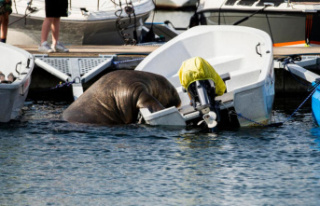From the very beginning, the history of space travel was shaped not only by scientific curiosity and a pioneering spirit, but also by political and military interests. In October 1957, when the Soviet satellite "Sputnik" transmitted beeps from earth orbit on shortwave frequencies, this did not trigger joy about scientific progress in the USA, but rather a deep shock. Because this beeping signaled a technological superiority of the big rival.
Space travel is in many respects a technological performance show and actually also of great military relevance. For example, rockets that can deliver satellites precisely into orbit around the earth are also fundamentally suitable as ICBMs. The US answer to Sputnik was the Apollo program. The first man on the moon should be an American.
Despite all the rivalry, the Soviet Union and the USA repeatedly carried out joint space activities, even during the Cold War. After the announced end of the Cold War, the joint construction and operation of the International Space Station (ISS) was of the greatest symbolic power for peace and cooperation.
Although more than a dozen countries and ESA are involved in the ISS, there are two dominant hosts: Russia and the USA. On the ISS, both are interdependent: the Russian module provides the drive and a stable orbit, the Americans guarantee the energy supply.
The ISS was originally supposed to be in operation until 2020 at the latest. Later, everyone agreed on an extension until 2024. Nasa boss Bill Nelson recently showed his determination to operate the ISS until 2030. Esa boss Josef Aschbacher also supports such an extension, he wanted to submit a corresponding proposal to the EU Council of Ministers next November.
But now the new Roskosmos boss Yuri Borisov has declared that Russia will definitely not extend its engagement beyond 2024. You want to go your own way. Moscow announced years ago that it would build a new space station. China already has an outpost in space. And the West will not want to do without it either.
The cards in space are being reshuffled. A lot is open. However, political and military aspects will probably become more important again – to the detriment of science.












